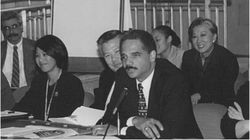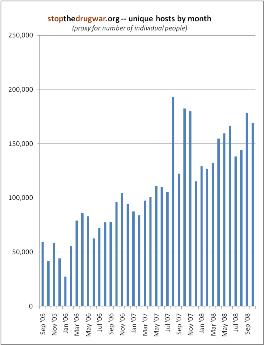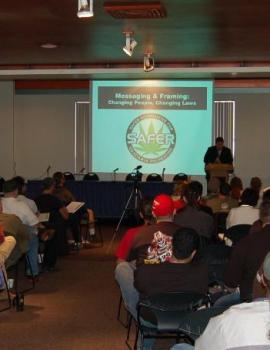The drug war records of some key Obama picks -- Biden, Emanuel, Holder -- are prompting wailing and gnashing of teeth among some drug reformers, but others suggest it's better to keep working quietly on progress than obsess on the past.
With national elections just days behind them, some 300 Colorado marijuana reform activists wasted no time getting down to brass tacks as they met in Denver for the 2008 Colorado Marijuana Reform Seminar and Boot Camp.
Earlier this month we wrote seeking support for StoptheDrugWar.org (DRCNet)'s lobbying programs, to help us lobby the Obama administration and Congress on causes near and dear to the hearts of drug reformers with which the President-Elect has said he agrees. This week we are seeking tax deductible donations to our educational programs, especially our web site, on which readership continues to go up and up.
A trio of bad apples from Arizona, including a DARE officer with a penchant for sexual assault, made the news this week, while the city of Berwyn, Illinois, found itself in a bit of hot water over the way it used asset forfeiture funds.
Who knew? Marijuana decriminalization is polling above 50% in Arkansas. Arkansas!
The California Department of Motor Vehicles is jerking the drivers' licenses of medical marijuana patients, saying they are "drug abusers." Now, Americans for Safe Access has filed a lawsuit to make them cut it out.
There were municipal elections across British Columbia Saturday, and drug reformers continued to hold power in Vancouver, were returned to the mayoralty in Grand Forks, and won a seat on the city council in Victoria.
While the conservative Dutch national government would like to see cannabis coffee shops go away, the mayors of the towns that have them beg to differ. In fact, most of them want to see production as well as sales tolerated.
The Australian state of New South Wales has joined Canada, China, and various European countries in allowing the cultivation of industrial hemp. Tough luck, American farmers.
Bolivia's President Evo Morales said yes to Obama, but no to the DEA at the UN this week
British attitudes toward drug users, sellers, and drug reform are heading in the wrong direction, according to a new poll.
Events and quotes of note from this week's drug policy events of years past.
Like other interest groups, the drug reform movement has the Obama transition under a microscope, searching for clues on the new administration's intentions as it scrutinizes those appointments for positions that are going to be key to advancing the cause. Some of the Obama transition team's early moves have some drug reformers sounding alarm bells, but other reformers -- not so much.

Eric Holder -- not the reformer's dream pick
Drug reformers were not particularly enthralled with Obama's vice-president selection, Sen. Joe Biden (D-DE), who made a career authoring drug war legislation. Biden can rightfully claim to be the father of the drug czar's office, he was a big fan of harsh sentencing laws, he crafted the horrid RAVE Act. Never encountering a "drug problem" that couldn't be fixed with another federal criminal law, Biden most recently authored a bill that would criminalize being on board a home-made submarine carrying drugs.
While Biden may have begun to see the light in recent years -- he is author of one of the best bills seeking to address the crack/powder cocaine sentencing disparity (which he helped create) -- drug reformers remain deeply suspicious of a man who built a political power base on the shoulders of the assembled ranks of law enforcement.
Nor did the appointment of Rep. Rahm Emanuel (D-IL) as White House chief of staff alleviate concerns. While the sharp-elbowed political operative has not been a leading drug warrior, neither has he shied from using drug war discourse as a weapon against his political foes.
One oft-cited example of Emanuel's penchant for drug war rhetoric came a decade ago, when he defended the Clinton administration's unconstitutional effort to punish physicians who recommended medical marijuana to patients. "We are going to continue to find ways within the administration to fight legalization and the notion of legalization," he said in an interview. "We're against the message that [California's medical marijuana initiative] sends to children," Emanuel demagogued. (Emanuel, now a member of Congress, did vote for the pro-medical marijuana Hinchey amendment in July of last year.)
This week's announcement that former Deputy Attorney General Eric Holder would be nominated for the Attorney General post did little to allay mounting fears that Obama was filling key positions for drug policy with Clinton-era drug war holdovers. Some were quick to point to Holder's time as US Attorney for the District of Columbia, when he pushed through changes in DC's marijuana laws that made sales a felony instead of a misdemeanor.
As the Washington Post reported:
In addition, US Attorney Eric H. Holder Jr. said in an interview that he is considering not only prosecuting more marijuana cases but also asking the DC Council to enact stiffer penalties for the sale and use of marijuana. "We have too long taken the view that what we would term to be minor crimes are not important," Holder said, referring to current attitudes toward marijuana use and other offenses such as panhandling.
Holder said he hopes to discourage some of that activity by being tougher on marijuana crimes. New guidelines should be in place by the end of the month, he said, noting that the District could learn from New York's "zero-tolerance" policy. There, crime plummeted when police aggressively enforced quality-of-life crimes, including panhandling and public drinking, which gave officers an opportunity to check for drugs, guns and outstanding warrants.
That same year, he told the Washington Times he was considering proposing a mandatory-minimum 18-month sentence for any marijuana sales. That, at least, didn't happen.
Drug reformers took some small solace, however, from Holder's comments on mandatory minimum sentencing in a 1999 interview. Responding to a question about whether it was time to review mandatory minimums, Holder said:
I do not think that we should ever foreclose the possibility that we take a look at how the laws that we have passed are working. I tend to think that mandatory minimum sentences that deal with people who commit violent crimes are almost always good things. I think the concerns are generally raised about mandatory minimum sentences for nonviolent drug offenders. And I think there are some questions that we ought to ask.
I do not go into it with a presumption that they're necessarily bad, but we ought to look at the statistics and see, are we putting in prison, are we using our limited prison space for the kind of people that we want to have there? Are the sentences commensurate with the kind of conduct that puts people in jail for these mandatory minimum sentences?
Those are the kinds of questions I think that we ought to ask. And as thinking legislators on both sides, Republicans and Democrats, liberal and conservative, I would hope that we would ask those questions and then go into it with an open mind.
With drug war cheerleaders like Biden and Emanuel and professional drug warriors like Holder being invited to join the Obama team, drug reformers are understandably skittish. But most are taking a wait and see attitude, even as they bemoan some of Obama's choices.
"Some of the appointments, such as Holder, are certainly concerning," said Bruce Mirken, communications director for the Marijuana Policy Project. "There is some problematic stuff in the past, yes, but people do change and learn. Who would have thought that a drug warrior like Bob Barr would end up as a Libertarian?" Mirken asked. "I don't think that because somebody said or did something we disagreed with a decade ago, he is necessarily bound to those same positions now, but we will be watching closely. If the time comes to freak out, we will, but it's premature to freak out now."
The reform community should not be freaking out, agreed Eric Sterling, who served as counsel to the House Judiciary Committee in the 1980s and now heads the Criminal Justice Policy Foundation. Instead, it should be trying to flex its muscles.
"I think the reform community is way overreacting and, more importantly, not taking the initiative," he said "Reform leaders ought to be asking themselves what letters they've written to President-elect Obama, what letters to the editor they've penned, what op-eds they've submitted. Is the movement doing anything other than passively reacting?" he asked.
"Our movement has been under such assault for the past eight years that we're really out of practice in being effective political actors," Sterling argued. "I just contacted [the left-leaning magazine] In These Times suggesting an article about taxing marijuana as a way to prevent the lay-off of public employees. Our movement should be reaching out to people like the public employee unions, maybe buying ads saying 'No teacher should be fired until the legislature tells us how many legal marijuana could pay for.'"
"What you can say about Emanuel and these other people is that they are political and will respond to pressure," said Sterling. "If Emanuel thought our issues were good politics, he would be standing on the ramparts, but it's not good politics because we haven't made it good politics. It's not enough to mobilize the drug reform aficionados, we have to be working with much more powerful organizations and interest groups around issues they care about. The dire situation with the economy right now and the lack of revenues for state and local governments is a tremendous opportunity for us, exactly like 1933 in that sense. What did they do then? They ended Prohibition and taxed alcohol."
Marijuana does not enjoy the same cultural favor that alcohol did, Sterling noted, but that can be overcome. "We need to frame the issue in very stark economic terms. We need to be asking who is going to teach our kids? How are we going to pay for teachers? If the state taxing marijuana is the only way to pay for teachers, should we do it? That marijuana isn't going anywhere. It's still going to be smoked, whether we tax it or not. Why don't we benefit from it?"
"Drug policy reform has its work cut out for it," said Kevin Zeese, a long-time reformer who doubts either major party is ready for fundamental change. "The best we can hope for is a little benign neglect, and that they not continue to waste law enforcement resources on medical marijuana providers in states that allow it."
Given the plateful of problems facing the incoming administration and the state of the drug reform movement, a big push on drug policy on the federal level is unlikely, Zeese argued. "We should be working locally to continue to build momentum and a real movement," he said, suggesting that "benign neglect" could come into play. "If the reform movement continues to push state and local initiatives, I think the Obama administration will stay out of those conflicts. I don't think we'll see the drug czar flying off to different states to campaign against initiatives, and that would be a good thing."
A big push for drug reform is not only unlikely, it may be unwise at this time, Zeese suggested. "The caution Obama brings to the job, and Biden and Emanuel's histories present some room for us to maneuver, but it may be best not to poke the sleeping bear with a stick. We don't want to wake up the criminal justice advocates in the federal government. Benign neglect is better than abuse. Perhaps we should just work under the radar and allow their political caution to work for us, instead of against us."
While Zeese could tick off the bad drug policy stances of some of Obama's newly-forming inner circle, he suggested that those stances were based more on political calculations than ideological enthusiasm. "As chair of the Senate Judiciary Committee, Biden aligned himself with police and prosecutors -- that is his criminal justice base, that's where the power and safety is. Emanuel was a clear architect of the crime control acts under Clinton that increased police numbers and lengthened sentences. But both these guys are essentially political animals and will take what looks like a hard line to neutralize an issue."
One area that could be an early indicator of the Obama administration's drug reform proclivities is the ongoing DEA raids against California medical marijuana providers. Obama vowed during the campaign to halt those raids. But the big news there could be that there is no news.
"We expect that Obama will keep his promise about ending the raids in California," said MPP's Mirken. "There are plenty of reasons for him to do so, including Colorado, New Mexico, Nevada, and Michigan -- all states that had gone Republican, but that he carried. Whatever else you think about Obama and his team, they can count, and it's hard for me to imagine that they think it is in their interest to continue a war against a quarter of the country, most of whom voted for him," he said.
"That doesn't have to happen in dramatic fashion, you don't have to hold a press conference, it could just be something that happens quietly," said Mirken. "It may be awhile before anyone really sees for sure that a change has occurred. And that's fine -- we don't need a press conference as long as he stops arresting patients and caregivers."
"Obama is no doubt already thinking about a second term and doesn't want to make drug policy reform an issue of conflict with Republicans," said Zeese. "He will play it safe, but there is some opportunity for us there, and I think ending the raids is one of the things he could make happen. He'd prefer not to have medical marijuana patients and advocates angry at him in places like California and Oregon."
"I think he will stop the raids," said Sterling. "I don't see how the raids are helpful to him unless the Republicans are able to gin up some anger about providers, so it would be wise to stay low-key and continue to work with state and local officials so it is not controversial at the local level. But if it becomes controversial, and the Republicans are able to make it an issue, then Obama will be against us. We need to stay under the radar on this right now."
While reformers watch to see what does and doesn't happen regarding the DEA raids -- will they just quietly vanish into that long good night? -- there is still plenty of work to do, said Sterling. "We have to build the movement. We keep seeing the same 300 people at the conferences, maybe 1,000 if you're talking about the harm reduction conferences. No one is going door to door in the black community talking about how the drug war is undermining public safety and its relationship with the police. No one is talking to the unions. We've done well on the education part of our issue, but we haven't done well in developing a political power base, and until we do that, we won't get reform."
back to top
This month's national elections are over, but marijuana reformers in Colorado are taking no breaks. Just 11 days after red state Colorado turned dramatically blue, nearly 300 activists and would-be activists gathered last Saturday morning at Regis University in Denver for the 2008 Colorado Marijuana Reform Seminar and Activist Boot Camp, designed to make them more effective and to pave the way for more marijuana law reform in the Rocky Mountain State.
There is plenty to build on. Colorado has been a medical marijuana state since 2001 and a decrim state since the 1970s. In the past few years, activists like Mason Tvert of
SAFER (Safer Alternatives for Enjoyable Recreation) and Brian Vicente of
Sensible Colorado have been building an impressive movement for a new set of reforms. In 2005, SAFER won a Denver vote to legalize marijuana possession, and after that was ignored, came back in 2007 with a winning lowest law enforcement priority initiative in Denver.
But while Denver appears ready to embrace legal weed, the rest of the state is not quite there yet, and a 2006 statewide legalization initiative ultimately came up short with 41% of the vote. A big part of the focus of the boot camp was to ensure that next time a legalization initiative appears on the ballot, it goes over the top.
To that end, SAFER and Sensible Colorado assembled a series of panel for the day-long seminar. Beginning with "Colorado's Marijuana Laws: Past, Present & Future," and "Everyone Can Agree: Colorado Needs Reform," "Citizen Lobbying: Reaching & Influencing Elected Officials," "The Media: How It Works, How We Can Use It, & Why It Matters," and culminating with "Taking Action: Building Support & Maintaining Momentum," organizers created a very full plate indeed for the assembled activists. The panels featured scientists, liberal and conservative public policy analysts, media representatives, and seasoned activists.
One big catch for the boot camp was House Majority Leader Paul Weissmann (D-Louisville), who explained the necessity and the how-to of lobbying elected officials to bring change. "We frankly just listen to each other unless there's an effort for people to get a hold of us," Weissmann said. It is more effective to build long-term relationships with elected officials than to make a campaign donation, he said. "The people who I remember more aren't folks who wrote a check, but the people who went door-knocking," he said.
"The 2008 campaign season only just ended for most people," said SAFER executive director Mason Tvert. "But for the growing number of Coloradans committed to reforming state and local marijuana laws, the 2009 campaign season has already begun. Our first goal -- to disprove the myth that marijuana makes people less motivated -- has clearly already been accomplished."
The boot camp filled an identifiable need among Colorado activists, said Tvert. As groups who had led campaigns and garnered considerable notoriety, it fell on SAFER and Sensible Colorado to address that need, he said.
"Because of all the work we've done around the state and all the media coverage we've received, we frequently hear from people who want to get involved; there are some every week," Tvert explained. "We wanted to find productive things for these people to do and we wanted to create a more supportive environment for ballot measures, so we identified areas where people can make a difference and developed materials so they can do things more effectively and understand the whys and wherefores," he explained. "The boot camp brought everyone together to provide them with the materials and some training. The point of the panels was to give them first-hand information that will help them be better, more effective activists," he added.

"We didn't realize it would garner this much interest," said a clearly pleased Tvert. "We got people from all around the state. There were students, there were professionals, there were retirees. There were medical marijuana people there, but this wasn't about medical marijuana; it was about broader marijuana policy reform."
"The boot camp was an unqualified success," declared Sensible Colorado's Brian Vicente. "We thought we might pull in 75 people on a Saturday morning, but I think we actually had 283 register. That shows there is an overwhelming interest in this issue in Colorado. We had lots of people from the Front Range because that's where most of the people are here, but we also had dozens of people from areas considered less friendly, like Colorado Springs and out on the West Slope."
That's important because even in unfriendly environments, votes matter, he said. "Whether it's someplace friendly, like Boulder or Fort Collins, or someplace unfriendly, if we can pick up even a couple of percentage points, that can make the difference in a statewide vote," he said.
"It was really inspiring to see everybody there focusing on the same goal, even people who don't necessarily smoke marijuana, but see it as a civil rights issue and want to help out victims," said Andrew Stephens, a 20-year-old student at Fort Lewis College in Durango, a seven-hour drive over the mountains from Denver. "I was outraged watching those federal raids on the California dispensaries -- that's what motivated me to get involved -- so I started a NORML chapter this year to work with other organizations and chapters to change marijuana policies."
Stephens said he was going to apply some of what he learned at the boot camp back home in Durango. "I'm interested in getting a lowest law enforcement priority initiative passed in Durango like there is in Denver," he said. "That would help give law enforcement more resources and time to spend on more important matters and lift a burden on college students who face persecution from law enforcement," he added, practicing his talking points.
Panelist Pam Clifton, outreach director for the Colorado Criminal Justice Reform Coalition, also called the event a success. "It was really well attended, people were really excited, and people stayed put in their seats," said Clifton. "It was a great event, very diverse, and there was a lot of energy in the air."
For Clifton, marijuana law reform is part of a broader criminal justice agenda. "We're about working to stop mass incarceration in Colorado, and recidivism and drug policy are really driving a lot of that, so a lot of our fight is about stopping the drug war," she said. "We want people to make the connection between how a marijuana conviction can affect the rest of their lives and changing those laws, and since we do a lot of grassroots activism, this event gave us an opportunity to reach out to these people."
The interest in last weekend's Marijuana Boot Camp may reflect not only the years of activism by the likes of Tvert, Vicente, and their allies, but also changing Colorado demographics and political attitudes. For the first time in decades, Colorado voted for the Democratic presidential candidate this year.
"You're certainly seeing more progressives and Democrats getting into power here, and that bodes well for marijuana reform," said Sensible Colorado's Vicente. "Also, Colorado had a very strong grassroots machine in place that helped Obama win a traditionally red state, so there's something to be said for people power. And the fact that almost 300 people showed up on a Saturday morning a week after the election to talk marijuana reform politics is also a very good sign."
"The atmosphere has really changed quite a bit," said Clifton. "We're really blue these days. Last year, the legislature passed an act creating a governmental commission on criminal justice. They have to reduce the prison population in this state, so they looked at recidivism, next is some juvenile justice stuff, and then sentencing. But measures to reduce the prison population are the low-hanging fruit. I think only after that we will have a real opportunity to make changes around the marijuana and other drug laws."
Part of what makes marijuana law reform a relatively lower priority, said Clifton, is that Colorado's marijuana laws are already quite liberal for simple possession. Under current state law, possession of less than an ounce is already decriminalized with a maximum sentence of a $100 fine.
But the fact that Colorado has relatively progressive marijuana laws already is no reason to slow down down, said Tvert. "Whether it's more local initiatives or another statewide one in 2010 or 2012, we want to get these people active in their communities spreading our message," said Tvert. "We made 25,000 four-page business cards with our marijuana is safer than alcohol message on one page, that it should be treated that way on the next, how to contact elected officials on the third, and lastly, how to contact us."
While the legislature and other sections of the criminal justice reform community may have their attention elsewhere, an army of activists is now haunting the streets of Denver and Boulder, the high plains of Eastern Colorado, and the snowy peaks of the Rockies, laying the groundwork to take it to the next level.
back to top
Earlier this month we wrote seeking support for StoptheDrugWar.org (DRCNet)'s lobbying programs, to help us lobby the Obama administration and Congress on causes near and dear to the hearts of drug reformers with which the President-Elect has said he agrees.
This week we are seeking tax deductible donations to our educational programs, especially our web site, on which readership continues to go up and up.
 StoptheDrugWar.org web site traffic has grown at 60% per year for the past two years, as the chart to the left shows, bringing our average number of visitors to more than 150,000 per month. Over two hundred thousand people are verified to have read election-related drug policy coverage on our web site since the primaries began in earnest last year, and that doesn't include the most numerous number of our readers, those who read the content on our daily blog on our home page. More than 100,000 people visited StoptheDrugWar.org between November 1 and November 15!
StoptheDrugWar.org web site traffic has grown at 60% per year for the past two years, as the chart to the left shows, bringing our average number of visitors to more than 150,000 per month. Over two hundred thousand people are verified to have read election-related drug policy coverage on our web site since the primaries began in earnest last year, and that doesn't include the most numerous number of our readers, those who read the content on our daily blog on our home page. More than 100,000 people visited StoptheDrugWar.org between November 1 and November 15!
|
notepad folder:

one book we offer:
 |
As our thanks for your support, we continue to offer a wide range of books, videos and StoptheDrugWar.org gift items to members donating over certain levels --
visit our donation page to read the full list. Also, everyone donating this week will receive a complimentary StoptheDrugWar.org "Truth Campaign" notepad folder, and all donors will receive a StoptheDrugWar.org bumper sticker and a square StoptheDrugWar.org stop sign sticker, both being reprinted this month.
Drug policy reform is such an important issue, but it's an important issue that needs your help. We at StoptheDrugWar.org need you to ensure that this time of change, will bring needed change, for a disadvantaged, demonized and under-represented group in our society, the targets of the brutal War on Drugs. Please donate today, and together we will make things happen.
Thank you very much for working to change this country's drug policies and for continuing to be part of StoptheDrugWar.org. And thank you for giving your support to our efforts at this important hour. Your contribution has never been more important.

David Borden
Executive Director, StoptheDrugWar.org (DRCNet)
News & Activism Promoting Sensible Reform
P.S. Every day that goes by, 4,000 people are arrested for drug offenses, the vast majority of them minor, and half a million nonviolent drug offenders languish yet another day in the staggering number of prisons and jails the government has very unwisely built. It's time to stop this senseless tragedy and shocking injustice. Please increase your commitment to ending the drug war by donating to StoptheDrugWar.org today. Thank you!
back to top
A trio of bad apples from Arizona, including a DARE officer with a penchant for sexual assault, made the news this week, while the city of Berwyn, Illinois, found itself in a bit of hot water over the way it used asset forfeiture funds. Let's get to it:
In Nogales, Arizona, a former Nogales DARE officer was convicted last Friday on numerous charges related to unwanted sexual contact with young women. Ramon Borbon, 40, was convicted of sexual abuse and obstructing a criminal investigation in the case of a 16-year-old girl whom he forced to touch him inappropriately and threatened to stop her from going to authorities. He was also convicted of sexual assault and kidnapping charges in the case of a 19-year-old woman for restraining and raping her. He was in uniform during both incidents. In a motion ruling during trial, Santa Cruz County Superior Court Judge James Soto wrote that Borbon has "a character trait which gives rise to an aberrant sexual propensity" and that he appeared to have "identified young, vulnerable females with a history of psychological and/or substance abuse problems that are less likely to come forward and if they do, are less likely to be considered credible." There are also at least four other complaints of sexual abuse against Borbon. The police department had earlier found them to be "without merit." He will be sentenced December 12.
In Phoenix, a Maricopa County jail guard was arrested Monday for allegedly smuggling cocaine in for an inmate. Detention officer Ryan White, 27, accepted sexual favors from two women who were the inmates' roommates in return for sneaking in the coke, which was found in his uniform pocket. He is now charged with two felonies -- promoting jail contraband and assisting in a criminal syndicate.
In Coolidge, Arizona, a guard at the Corrections Corporation of America's Central Arizona Detention Center was arrested last week by the FBI on charges he tried to smuggle cocaine into the prison there. Juan Nunez is charged with attempted provision of a prohibited object to an inmate and possession of cocaine with intent to distribute. According to the criminal complaint in the case, Nunez had been negotiating for the past two weeks with an inmate's family to bring cocaine into the prison. On November 6, Nunez met with an FBI agent possessing as an outside source for cocaine and accepted a half-ounce of cocaine and $1,600 for agreeing to smuggle it into the private prison. He was arrested after that meeting. A conviction for trying to bring a prohibited object to an inmate in this case carries a maximum penalty of 20 years in federal prison, a $250,000 fine or both, and a conviction for possession of cocaine for sale carries a maximum penalty of 20 years in federal prison, a $1 million fine or both.
In Berwyn, Illinois, the US Justice Department has accused the city of Berwyn of misusing drug forfeiture money. After reviewing the city's annual audit of asset forfeiture spending, the department's Asset Forfeiture and Money Laundering Section sent the city a letter citing various "impermissible expenditures," including spending too much of the asset forfeiture fund in the years 2004 and 2005. Since asset forfeiture funds are generally supposed to be used for crime prevention, the department cited more than $120,000 used to pay salaries, $88,000 in "cash transfers" to the Berwyn Park District, $156,000 in "cash transfers" to two local school districts, and $91,000 for bus trip for senior citizens. In all, the city may have to pay back more than $760,000 in improperly disbursed asset forfeiture funds. While schools, parks, and senior citizen bus rides are all worthy activities, spending asset forfeiture funds on them is a violation of the law.
back to top
A recent Zogby International poll commissioned by the Arkansas-based Drug Policy Education Group has found that a slight majority of respondents favor decriminalization of the adult use and possession of marijuana. The poll was conducted November 7-11 and was based on a Zogby online panel of 436 voters deemed by Zogby to be representative of the state's adult population. The margin of error was +/- 4.8%.
Respondents were asked the following question: "In 2007, over 7,400 adults were arrested in Arkansas for misdemeanor possession of one ounce or less of marijuana, over half the state's total drug arrests. According to a national 2005 study, state and local governments spend an average of $10,400 per arrest on police, courts, and jails. Based on that estimate, 2007 marijuana arrests will cost Arkansas taxpayers nearly $77 million dollars. Knowing this information, would you strongly support, somewhat support, somewhat oppose, or strongly oppose a law that would eliminate the penalties for adult marijuana possession of one ounce or less?"
Slightly more than 35% strongly supported changing the pot laws, with another 17% somewhat supporting it, for a total of 53% in favor of decriminalization. On the other side of the coin, 38% strongly opposed and 7% somewhat opposed decrim, for a total of 45%. Three percent weren't sure.
Democrats and independents supported decrim by a margin of two-to-one, but only 29% of Republicans supported it. Intensity is on the side of Republicans, with 63% strongly opposed compared to 49% of both Democrats and Independents who are strongly in support.
A slim majority of voters under 64 would support decrim, with the highest proportion among the under-30 group. Among the young, 58% supported decrim. Majorities of both whites (51%) and African Americans (64%) said they would support such a law, while women (59%) were more likely than men (46%) to say they would support it.
A similar, but slightly differently worded poll commissioned by the Drug Policy Education Group in 2006 had similar findings. In that poll, which asked voters if they would support "reducing" the penalties for adult marijuana possession offenses, 61% said yes, while 35% said no.
Arkansas has been the scene of drug reform activism, mainly around marijuana, for several years now. Initiatives making adult marijuana possession offenses the lowest law enforcement priority passed by two-to-one margins in Eureka Springs in 2006 and in the college town of Fayetteville this month. State drug reform groups like the Drug Policy Education Group and its predecessors have also been tilling the ground in the Razorback State. Reform bubbles up in the most surprising places, and these poll results suggest Arkansans may be more receptive than most people imagined.
back to top
The medical marijuana advocacy group Americans for Safe Access (ASA) filed a lawsuit Wednesday against the California Department of Motor Vehicles after it revoked the license of a medical marijuana patient solely for being a medical marijuana patient.
The plaintiff is Rose Johnson, 53, of Atwater. Johnson, a registered medical marijuana patient, had a clean driving record and no accidents in 37 years behind the wheel. But the DMV refused to renew her license on July 26 after obtaining her medical records and finding out she used marijuana medicinally.
According to the DMV, Johnson's license was revoked "because of... [an] addiction to, or habitual use of, [a] drug," thereby rendering her unable to safely operate a motor vehicle, even though no evidence existed to substantiate this claim.
"The DMV cannot simply disregard California's medical marijuana law," said ASA Chief Counsel Joe Elford, who is representing Ms. Johnson in her claim against the DMV. "When the voters of California enacted the Compassionate Use Act, they never intended to authorize the DMV to strip medical marijuana patients of their drivers' licenses," continued Elford. "The DMV should not be in the business of revoking the licenses of drivers like Ms. Johnson simply because she is a medical marijuana patient."
ASA said Johnson is not alone in losing her license. Suspension or revocation of drivers' licenses for qualified medical marijuana patients has occurred in at least eight California counties, including Alameda, Butte, Contra Costa, Glenn, Merced, Placer, Sacramento, and Sonoma.
The DMV justifies its license revocations of medical marijuana patients by calling them "drug abusers" despite no evidence to back that claim. The DMV has not taken similar blanket action against people prescribed opiates, barbiturates, sedatives, tranquilizers, or stimulants.
State and local police in California have been instructed by Attorney General Jerry Brown to respect the state's medical marijuana laws and not arrest medical marijuana patients or take their medicine. "The DMV is not under a different set of requirements than local police in California," said Elford. "The failure to uphold California's medical marijuana law is entirely inappropriate for any local or state agency."
The lawsuit was filed in Merced Superior Court. It is expected to be heard sometime in the next few months.
back to top
Municipal elections in British Columbia Saturday saw Vancouver get another in a string of pro-drug reform mayors, while a marijuana reformer was returned to the mayor's office in Grand Forks in the interior, and another prominent reform advocate was elected to the city council in Victoria.
In Vancouver, the civic electoral coalition Vision Vancouver succeeded in placing its candidate, Gregor Robertson in the mayor's seat as well as sweeping eight of 11 council seats. Robertson and Vision Vancouver are strong supporters of the city's pioneering Four Pillars drug policy.

Philippe Lucas (from vicgreens.com)
As Vision Vancouver notes in its
platform, it will: "Focus on the Four Pillars to deal with drugs in our communities. Prevention, treatment, harm reduction, and enforcement are the most effective tools to make our communities safer. This includes support for InSite, a focus on access to treatment, and expanding prevention education programs."
Meanwhile, in the small interior border town of Grand Forks (pop. 5,000), former mayor and leader in Marc Emery's BC Marijuana Party Bryan Taylor was reelected. Taylor came to drug reform initially around industrial hemp but soon emerged as a leading BC Marijuana Party campaigner in the 2001 elections. He is barred from entering the US, which he can see from his hillside home outside Grand Forks, originally because he was arrested for hemp cultivation ("drug trafficking," in official US-speak). But even after the Canadian government dropped charges against him, US border control authorities continue to deny him entry, accusing him of "fraud and misrepresentation" if he fails to admit he smokes marijuana and deeming him ineligible to enter the country if he does admit it.
And on Vancouver Island, one of the Canadian drug reformers most familiar to his American counterparts, Philippe Lucas, won a seat on the Victoria city council running as a Green Party candidate. Lucas will be joined by Mayor-elect Dean Fortin, who also supports harm reduction and has vowed to find a permanent location for the city's needle exchange program.
In a Victoria radio interview after the election, Fortin said Lucas "is going to challenge the council a lot" and "will be pushing the harm reduction model."
That's no surprise. In addition to running the Vancouver Island Compassion Society, Lucas also authored the BC Green Party drug policy and substance abuse platform planks, which include calls for a legal, regulated market in marijuana. The soft-spoken but keenly focused Lucas will no doubt be a strong force for reform in Victoria.
All in all, a good day for drug reform and its advocates in British Columbia. It looks like BC will retain its position in the vanguard of drug reform in the Western hemisphere.
back to top
A solid majority of mayors of Dutch towns that currently have cannabis coffee shops are happy with the way they are working and favor legalizing the entire marijuana supply chain, according to polls conducted by Binnenlands Bestuur magazine and the NRC newspaper. Under current Dutch policy, marijuana sales are illegal but tolerated in small amounts at licensed coffee shops, but the production of marijuana to supply the coffee shops remains illegal and not tolerated.

downstairs of a coffee shop, Maastricht (courtesy Wikimedia)
The conservative national government has been trying to eliminate the coffee shops or at least reduce their numbers. But it looks like the mayors of Holland's most important towns and cities are on the other side of the issue.
The Binnenlands poll identified 109 municipalities with coffee shops and elicited responses from the mayors of 88 of them. Of the mayors surveyed, 54 said they favored legalizing the entire supply line, while 25 said they were satisfied with the status quo, and nine wanted to ban coffee shops. That means nearly 90% of the mayors surveyed want either the status quo maintained or liberalized.
The NRC newspaper survey asked 70 local councils whether they wanted the national government to regulate the supply of marijuana to coffee shops. More than 75% said yes.
Meanwhile, the number of coffee shops in Holland continues its slow decline under the conservative government. In 1999, there were 846 shops; in 2005, there were 729; last year, the number was down to 702.
back to top
American hemp consumers still can't grow their own, but as of this week, they now have one more choice of where to import it from. The state government of New South Wales, Australia's most populous state, Wednesday approved large-scale hemp farming and is set to begin considering license applications under the new plan.

hemp plants (Luke Zigovitz for votehemp.com)
Hemp, the lanky, minimal-THC cousin to recreational marijuana, produces oils used in foods and balms, as well as fibers that are used in in clothing, cosmetics, livestock and animal feeds, and building materials, among other things. The US DEA considers hemp to be marijuana and bars its cultivation to the US, although due to a federal appeals court ruling, it has been blocked in its efforts to ban hemp imports or the sale of hemp products here.
Hemp is also environmentally friendly. It requires little water and grows quickly. In the US Midwest, feral hemp plants grow in abundance more than 60 years after fields were planted during World War II's "Hemp For Victory" campaign and then destroyed after the war.
"Industrial hemp has the potential to provide farmers with a much-needed additional fast-growing summer crop option that can be used in rotation with winter grain crops," said the Minister for Primary Industries, Ian Macdonald, in remarks reported by the Sydney Morning Herald. "It's a potentially lucrative industry due to its environmentally friendly nature."
Under the Hemp Industry Act regulations, farmers must be licensed, fields must be audited and regularly inspected, and police must test the crop to ensure that it has insignificant THC levels.
Some 200 people have contacted the Department of Primary Industries to inquire about growing hemp, the Morning Herald reported.
Australia will now join Canada, China, and a number of European countries as hemp producers. The US will continue to import the hemp it consumes. Tough luck, American farmers.
back to top
Bolivian President Evo Morales said at a Monday news conference at the UN that he would like to improve ties with the incoming administration of Barack Obama, but that the DEA would not be allowed back in Bolivia during the remainder of his term. The comments signal an effort to restore ties with the US that were badly frayed during the Bush administration while still retaining Bolivian sovereignty over its drug control policies.

Evo Morales, probably holding a coca branch
"My interest is how to improve relations with the new president," Morales said after addressing the UN General Assembly. "I think we could have a lot of things in common.
If we talk about change I have some experience now," he said, referring to the Obama presidential campaign's slogans based on the need for change. "I think it would be good to share experiences with the new president-elect."
Morales, a former coca grower union leader who became the first indigenous person to become Bolivia's leader, compared himself to Obama, who is the first black man to win the US presidency. Better relations between the two countries would have to be based on "respect from one government to another," Morales said.
There has been tension between the US and Morales over his "zero cocaine, but not zero coca" policies, under which Bolivian farmers in certain areas are allowed to grow coca for traditional and industrial uses. But because the Morales government appears committed to battling the cocaine trade, US criticism of his coca policies was muted until recently.
In response to what it called US meddling in its internal affairs, Bolivia has this fall undertaken a number of measures to hit back. It ordered USAID to leave the Chapare coca growing region, and after unrest from right-wing separatists resulted in bloody conflict in September, Morales expelled the US ambassador. The US retaliated by expelling Bolivia's ambassador to Washington and by "decertifying" Bolivia as not cooperating in US drug war goals. After that, Morales first barred over-flights by US drug surveillance planes and then, two weeks ago threw the DEA out of the country.
"The DEA will not return whilst I am still president," Morales said, speaking in Spanish through an interpreter. Nor does he want US anti-drug aid. He said he was working with other countries in the fight against drug trafficking. "We've discussed matters with Brazil, Russia and France, where they manufacture helicopters," he said. "We want to buy some, perhaps using emergency loans. There is interest in South American countries and Europe to join together to fight against a common problem, which is drug trafficking."
And Washington is the odd man out. Perhaps overall relations will warm with an Obama presidency, but not if the US insists that the DEA be allowed back.
back to top
If a comprehensive poll released last weekend is accurate -- and there is no reason to think it isn't -- British public opinion on drug policy is headed in the wrong direction. The poll conducted by ICM Research for the Observer and the Guardian newspapers found that public attitudes toward drug use, drug users, and drug sellers had grown decidedly more hard-line in recent years.
According to the poll, the proportion of people who think drug laws are "too liberal" has increased from 25% in 2002 to 32% now. At the same time, the number of people who think the drug laws are "not liberal enough" has dropped from 30% to 18%, and support for decriminalizing soft drugs has declined from 38% to 27%.
Respondents showed little sympathy for people who distribute drugs, whether they be professional drug dealers or merely sharing them with friends. About 70% said that all dealers should be treated the same -- with prison sentences. And 63% said drug addicts should be imprisoned.
Somewhat paradoxically, there is strong, though not majority, support for decriminalizing drug possession (38%) and making drugs available to addicts by prescription (44%).
Home Secretary Jacqui Smith told the newspapers hardening public attitudes were driven in part by concerns about stronger strains of cannabis. Both the Labor government and the British tabloid media have been engaged in a sometimes hysterical campaign to whip up fears about "skunk" in particular, as if that specific high-potency strain were somehow different from "regular" marijuana.
"This is a very important determinant of our decision to reclassify [cannabis from a Class C to a Class B drug]. This is a different drug even to that which was reclassified from B down to C [in 2003]," she claimed. "People are now beginning to recognize this isn't just some kind of harmless thing, but can have a serious impact on young people's mental health." People also realized marijuana production involved organized crime, she added.
But Martin Smith, the director of Drugscope, told newspapers the media and the government had falsely portrayed the drug problem as worse than it really was. "Although overall illegal drug use has been falling and significant progress has been made in tackling drug-related crime, many people believe the problem at best is getting no better," he said.
back to top
November 23, 1919: Mescaline is first isolated and identified by Dr. Arthur Heffter.
November 22, 1963: Aldous Huxley uses LSD to enhance his awareness as he dies.
November 22, 1975: Colombian police seize 600 kilos from a small plane at the Cali airport -- the largest cocaine seizure to date. In response, drug traffickers begin a vendetta known as the "Medellin Massacre." Forty people die in Medellin in one weekend. This event signals the new power of Colombia's cocaine industry, headquartered in Medellin.
November 24, 1976: Federal Judge James Washington rules that Robert Randall's use of marijuana constitutes a "medical necessity."
November 21, 1987: Jorge Ochoa is arrested in Colombia. Ochoa is held in prison on the bull-smuggling charge for which he was extradited from Spain. Twenty-four hours later a gang of thugs arrive at the house of Juan Gomez Martinez, the editor of Medellin's daily newspaper El Colombiano. They present Martinez with a communique signed by "The Extraditables," which threatens execution of Colombian political leaders if Ochoa is extradited. On December 30, Ochoa is released under dubious legal circumstances. In January 1988, the murder of Colombian Attorney General Carlos Mauro Hoyos is claimed by the Extraditables.
November 27, 2001: Dr. Francisco Moreno of the University of Arizona at Tucson begins providing subjects who suffer from obsessive-compulsive with psilocybin, the active ingredient in mushrooms. The government-approved research is funded by the Multidisciplinary Association for Psychedelic Studies and the Heffter Research Institute.
November 26, 2002: The Winston-Salem Journal (NC) reports that more than 30 drug defendants in Davidson County have had charges dismissed or convictions overturned since the officers investigating their cases were charged with distributing drugs and planting evidence.
back to top











